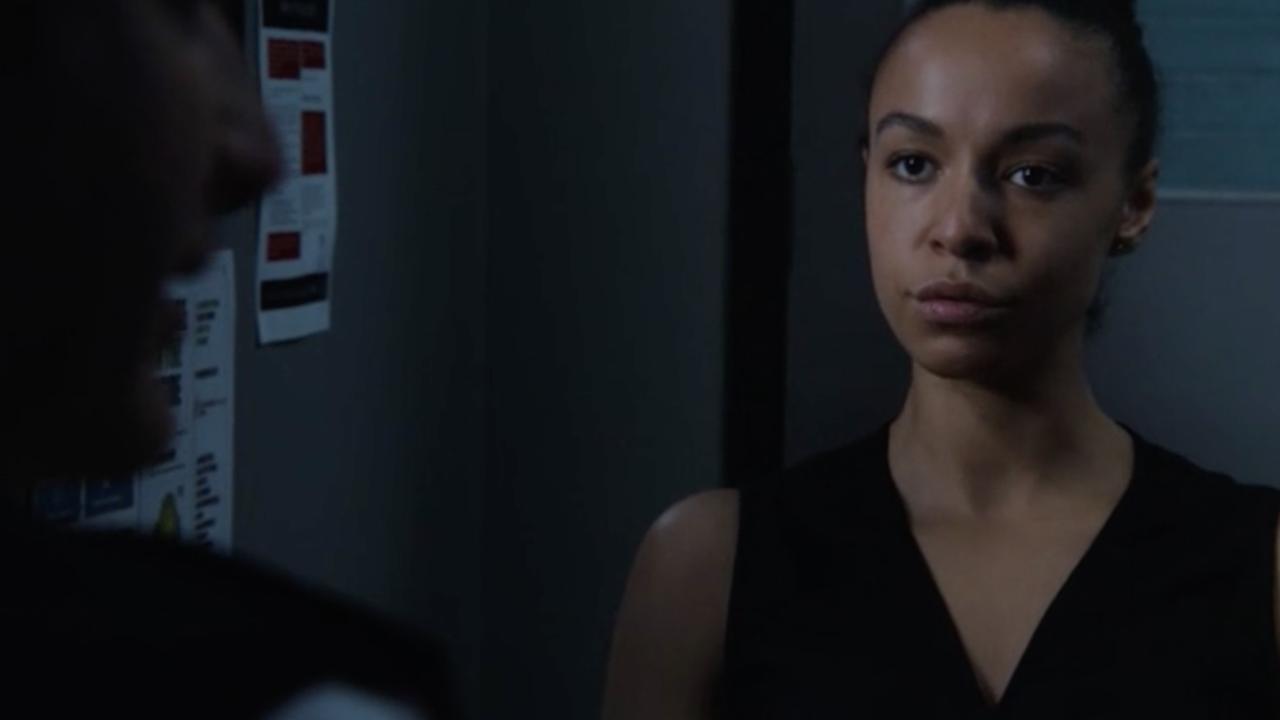Elisabeth Moss on new thriller The Kitchen, violent men and the future of The Handmaid’s Tale
Elisabeth Moss reveals the parallels between The Handmaid’s Tale and new thriller The Kitchen and says that June is just crazy enough to survive last season’s cliffhanger.
Entertainment
Don't miss out on the headlines from Entertainment. Followed categories will be added to My News.
After filming the second season of Top Of the Lake in and around Sydney’s Bondi Beach and now back for Leigh Whannell’s The Invisible Man, Elisabeth Moss says she feels right home in Australia.
But she’s not sure whether she’s quite at honorary citizen status quite yet.
“I don’t know, that’s up to you guys,” she says with a laugh over the phone from LA, trying to shake of the effects of jet lag after yet another long trans-Pacific flight.
“It’s great to be back there — I know it pretty well now so it doesn’t feel that foreign to me. I think this was my sixth trip there so I am pretty familiar with it. Some people go from New York to LA — I seem to go from New York to Sydney.”
READ MORE:
MELISSA McCARTHY: I DIDN’T RUIN YOUR CHILDHOOD
WHY ELISABETH MOSS NEARLY TURNED DOWN HANDMAID’S TALE
AUSSIE HANDMAID’S TALE STAR’S BRUTAL WARNING
Moss has briefly returned to Hollywood to promote new film The Kitchen and says that when she signed on to play a woman driven to extremes by violence at the hands of men in the female driven crime thriller, she didn’t need to do much research.
She’d already been there.
For three seasons she has played June Osborne — aka Offred or Ofjoseph — in the hit TV series The Handmaid’s Tale and has suffered all manner of indignities and abuse from the ruling men in the fundamentalist, dystopian state of Gilead, winning an Emmy and Golden Globe for her troubles.
So for her role as Claire, the battered wife of an Irish gangster in 1970s New York, she’d already done a lot of the heavy lifting.

“I have read a lot and spoken to people in the past for previous roles and Handmaid’s Tale as well, so I hung on to that,” she says of the graphic novel adaptation in which she stars alongside Melissa McCarthy and Tiffany Haddish as a trio of women who take over a crime racket when their husbands are sent to jail.
“It’s something that is interesting to shed light on. Whether it’s physical or emotional abuse, it’s a very difficult thing for anyone to talk about — man or woman — and to me it’s a subject that I feel it’s important to be supportive of people who have experienced that.”
For Moss, the parallels between the two characters were clear.
In The Kitchen, the uneducated, downtrodden Claire becomes numbed to the violence meted out to her to the point that she herself embraces murder and butchery — and even enjoys it. And in the final few episodes of season three of The Handmaid’s Tale (spoiler alert!), an increasingly desperate June kills the senior political figure who is trying to rape her, as well as shooting a soldier in the finale so that a plane load of children can escape to the safety of Canada.
“With both of those characters, Claire and June, they have reached a point where they can’t take it anymore,” Moss says.
“They have reached a point where they cannot suffer it one more time and they can’t swallow it any more. June reaches a breaking point, which we saw in Episode 11. Her body physically actually cannot respond in any other way than fighting back. It’s almost not even voluntary at first, that feeling that she just cannot be touched by that man in that way.

“With Claire as well, she reaches a point where enough is enough and she cannot take it anymore, she cannot be hit one more time or pushed around one more time. And she doesn’t have a lot of options — I wished that for Claire she could go to a support group and find a good job and get healthy in a better way but unfortunately in this particular story she doesn’t have a lot of options or another path to take.”
In each of the stories, the women find their power by banding together to fight a common enemy, which Moss believes holds true in life as well.
“I think women together are so much stronger than apart,” she says.
“And one of the ways that in Gilead they try to control women is to separate them, to individualise them and take away their voice and their power. Because the collective voice is so much louder. And that is absolutely the same thing in this film.
“The women when they are together and supporting each other and communicating and have each other’s backs, it worked. And when they start to turn on each other and betray each other, it doesn’t work anymore. And obviously that’s very true of life, not just women, but humans. When we band together to support a cause and raise our collective voice we are so much louder than someone just by themselves and screaming into the wind.”

With her roles playing strong, capable women in male-dominated environments in revered series such as The West Wing, Mad Men and Top Of the Lake, Moss has been dubbed “the Queen of peak TV”.
But her work for The Handmaid’s Tale, on which she is also a producer, has been her most involving yet, spending up to 10 months a year on the critically acclaimed show.
While the most recent season attracted some criticism for its meandering pace, it finished strongly and has been renewed for a fourth season.
Moss says, that while she or the show’s creators don’t have a finite arc in mind, she realises that it can’t go on indefinitely as much as she loves playing June.
In Margaret Atwood’s book, the deeply religious Gilead regimen, stands for hundreds of years, but Moss says that’s not the story they are trying to tell.
“It’s the story of one woman and one mother and her journey to getting her child out and getting her child back,” she says.
“Of course there is a larger context there that is very interesting but it’s not my decision how long it goes. It’s been an incredible job that I would be happy to do for a long, long time. But at the same time I think that we will all know, those of us who work there, we will all know when it’s time to end the story.”
After the dramatic events of the season three finale, which left the ever bolder and more committed June fighting for her life, many fans have wondered just how she has managed to survive for so long in a show where women’s lives are so cheap.

“Well, she’s our lead character,” says Moss with a laugh, before adding.
“I think part of the reason she is still around is that she has learned to subvert the system in a way that nobody else has. She is probably just crazy enough to survive. I think you either get caught, you go crazy or you become stronger than your enemies. I think June has learned to become more ruthless, stronger, crueller and more brave than the people that she is fighting. I guess that’s her key to survival — but we’re not done yet.”
Regardless of how long The Handmaid’s Tale runs, Moss agrees that it’s more important than ever.
All of the oppressive events and customs in Atwood’s book have occurred in real life at some point in history and Moss’s co-star Ann Dowd recently told Screen that she was worried Gilead was drawing closer than ever in the wake of anti-abortion laws on the cards in some southern states in the US.
“I think it’s more important than ever to be telling the stories that are relevant today and the stories that reflect all kinds of people and the stories that reflect us back at ourselves,” agrees Moss.
“The restrictions of freedom and of choice for all kinds of people not just women — the human rights violations and the equal rights violations are worse than they have ever been. And it’s not just in this country — it’s all over the world and I don’t think you can be human without caring about that situation and without it being important to you.”
The Kitchen is released on Thursday, The Handmaid’s Tale is now available on SBS On Demand.


